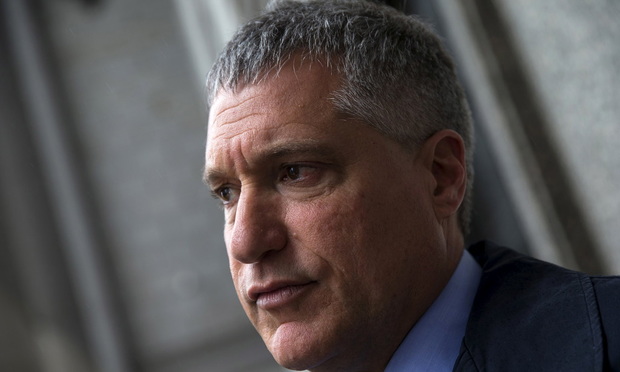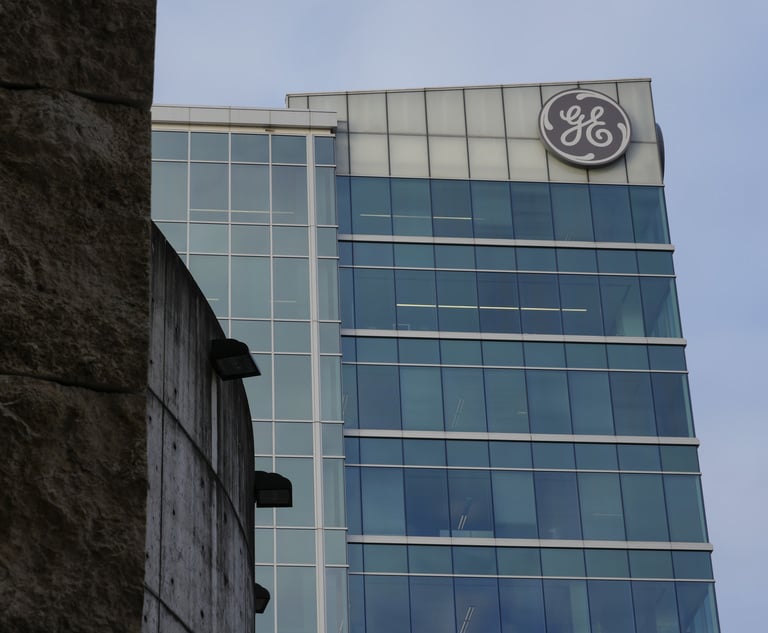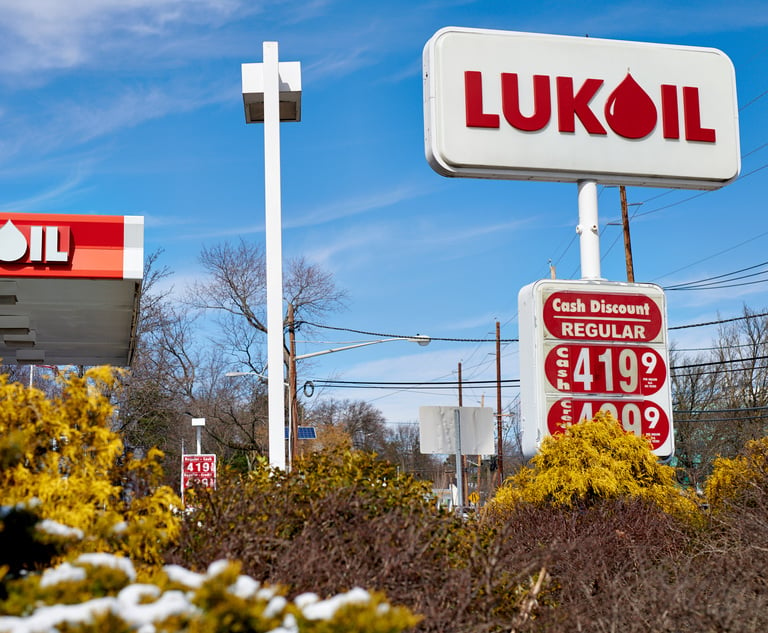Donziger Faces Criminal Contempt Prosecution Team at Seward & Kissel
After the Southern District U.S. Attorney's office said it didn't have the resources to take up the case, a judge has appointed a Seward & Kissel team to prosecute Steven Donziger for criminal contempt.
August 13, 2019 at 04:48 PM
4 minute read
 Steven Donziger. Photo: Reuters
Steven Donziger. Photo: Reuters
Steven Donziger, the suspended attorney who was ordered to pay an $800,000 judgment for allegedly rigging an Ecuadorian lawsuit against Chevron Corp., is now being prosecuted for criminal contempt by court-appointed attorneys at Seward & Kissel.
Donziger’s cutthroat legal war with Chevron has raged for years, but has significantly escalated in recent weeks. On July 31, U.S. District Judge Lewis Kaplan of the Southern District of New York ordered Donziger to explain why he shouldn’t be prosecuted for allegedly failing to turn over assets to Chevron and comply with discovery orders.
In an unusual twist, the judge also appointed Rita Glavin, Brian Maloney and Sareen Armani of Seward & Kissel to prosecute Donziger for criminal contempt. In appointing a private prosecution team, the judge cited federal criminal rules and an explanation by the U.S. Attorney for the Southern District of New York that the office declined to take up the case referral ”on the ground the matter would require resources that we do not have readily available.”
The judge gave Glavin and her colleagues the power to issue subpoenas and to seek and execute search warrants.
For now, Donziger—who is represented by Andrew Frisch—is wearing an ankle bracelet and has been made to surrender his passports, according to an Aug. 9 letter filed by Glavin. Donziger has been released on $800,000 bond secured by his apartment and signed off by two people, one of whom is his wife.
The criminal case is the latest development in a long-running legal war. Donziger represents a group of Ecuadorians who sued Chevron for widespread environmental contamination and won a multibillion-dollar ruling in Ecuadorian courts. Chevron said the decision was procured by fraud, however, and has fought efforts to enforce the judgment and won a racketeering suit against Donziger.
The oil company and its legal team at Gibson, Dunn & Crutcher have lately been trying to seize Donziger’s assets. Donziger and his law firm Donziger Law were ordered in July to pay Chevron $3.4 million in attorneys’ fees after Lewis agreed to hold him in civil contempt.
Kaplan’s appointment of the Seward & Kissel lawyers as special prosecutors isn’t without precedent. A special prosecutor was appointed to investigate the leak of evidence in a political corruption case in Rhode Island and ultimately racked up $152,247 in legal bills, paid by the Administrative Office of U.S. Courts, according to a 2006 decision by the U.S. Court of Appeals for the First Circuit.
Like the First Circuit case, Lewis appointed the Seward attorneys under Federal Rule of Criminal Procedure 42(a)(2). The Administrative Office’s practice of paying appointed special prosecutors’ fees is “usual in Rule 42(a) appointments,” said the 2006 decision.
Harry Sandick, a former prosecutor and white-collar defense partner at Patterson Belknap Webb & Tyler, said he couldn’t recall a lawyer in private practice being appointed to prosecute a case from his time in the Southern District, although he did recall SDNY prosecutors taking up a contempt case against artist Shepard Fairey, who admitted to manipulating evidence in a copyright suit. He noted that Glavin, who previously worked nearly 12 years for the Justice Department, was an experienced prosecutor and defense lawyer.
“Hopefully, she’ll be able to resolve this matter in a way that is fair to all sides,” he said.
This case is a reunion of sorts for Glavin and Frisch, Donziger’s lawyer. They represented co-defendants in the Manhattan District Attorney’s case against Dewey & LeBoeuf executives. “Ms. Glavin and I have worked very well together in the past, and I anticipate that she and I will have many constructive conversations to determine whether there is a viable way to resolve the case short of trial,” Frisch said in an Aug. 11 letter.
“If not, we will try the case,” Frisch’s letter continued. “Mr. Donziger is fully aware of the possible consequences in the event of an unfavorable verdict and will face them if and when a trial so results.”
Donziger called the charges “an act of Trump-style retribution” by Kaplan in an Aug. 1 tweet.
Frisch, who runs his own firm, said a follow-up conference was set for late September but declined to comment on the case generally. Glavin declined to comment.
Randy Mastro, a partner at Gibson Dunn who represents Chevron, would only say of the criminal prosecution that it is a separate matter from the civil suit “to which Chevron is not a party.”
This content has been archived. It is available through our partners, LexisNexis® and Bloomberg Law.
To view this content, please continue to their sites.
Not a Lexis Subscriber?
Subscribe Now
Not a Bloomberg Law Subscriber?
Subscribe Now
NOT FOR REPRINT
© 2025 ALM Global, LLC, All Rights Reserved. Request academic re-use from www.copyright.com. All other uses, submit a request to [email protected]. For more information visit Asset & Logo Licensing.
You Might Like
View All
Oil Co. Alleges Plot to Drive Away Competition in NYC's Liquid Fuel Market
3 minute read

GE Agrees to $362.5M Deal to End Shareholder Claims Over Power, Insurance Risks
2 minute read
Lukoil Pan Americas Sues Investment Firm Over Alleged $18 Million Breach
Trending Stories
- 1Cleary Nabs Public Company Advisory Practice Head From Orrick in San Francisco
- 2New York Environmental Legislation in 2024
- 3Cravath Hires Paul Weiss Antitrust Co-Chair
- 4Contract Technology Provider LegalOn Launches AI-powered Playbook Tool
- 5Court of Appeals Provides Comfort to Land Use Litigants Through the Relation Back Doctrine
Who Got The Work
J. Brugh Lower of Gibbons has entered an appearance for industrial equipment supplier Devco Corporation in a pending trademark infringement lawsuit. The suit, accusing the defendant of selling knock-off Graco products, was filed Dec. 18 in New Jersey District Court by Rivkin Radler on behalf of Graco Inc. and Graco Minnesota. The case, assigned to U.S. District Judge Zahid N. Quraishi, is 3:24-cv-11294, Graco Inc. et al v. Devco Corporation.
Who Got The Work
Rebecca Maller-Stein and Kent A. Yalowitz of Arnold & Porter Kaye Scholer have entered their appearances for Hanaco Venture Capital and its executives, Lior Prosor and David Frankel, in a pending securities lawsuit. The action, filed on Dec. 24 in New York Southern District Court by Zell, Aron & Co. on behalf of Goldeneye Advisors, accuses the defendants of negligently and fraudulently managing the plaintiff's $1 million investment. The case, assigned to U.S. District Judge Vernon S. Broderick, is 1:24-cv-09918, Goldeneye Advisors, LLC v. Hanaco Venture Capital, Ltd. et al.
Who Got The Work
Attorneys from A&O Shearman has stepped in as defense counsel for Toronto-Dominion Bank and other defendants in a pending securities class action. The suit, filed Dec. 11 in New York Southern District Court by Bleichmar Fonti & Auld, accuses the defendants of concealing the bank's 'pervasive' deficiencies in regards to its compliance with the Bank Secrecy Act and the quality of its anti-money laundering controls. The case, assigned to U.S. District Judge Arun Subramanian, is 1:24-cv-09445, Gonzalez v. The Toronto-Dominion Bank et al.
Who Got The Work
Crown Castle International, a Pennsylvania company providing shared communications infrastructure, has turned to Luke D. Wolf of Gordon Rees Scully Mansukhani to fend off a pending breach-of-contract lawsuit. The court action, filed Nov. 25 in Michigan Eastern District Court by Hooper Hathaway PC on behalf of The Town Residences LLC, accuses Crown Castle of failing to transfer approximately $30,000 in utility payments from T-Mobile in breach of a roof-top lease and assignment agreement. The case, assigned to U.S. District Judge Susan K. Declercq, is 2:24-cv-13131, The Town Residences LLC v. T-Mobile US, Inc. et al.
Who Got The Work
Wilfred P. Coronato and Daniel M. Schwartz of McCarter & English have stepped in as defense counsel to Electrolux Home Products Inc. in a pending product liability lawsuit. The court action, filed Nov. 26 in New York Eastern District Court by Poulos Lopiccolo PC and Nagel Rice LLP on behalf of David Stern, alleges that the defendant's refrigerators’ drawers and shelving repeatedly break and fall apart within months after purchase. The case, assigned to U.S. District Judge Joan M. Azrack, is 2:24-cv-08204, Stern v. Electrolux Home Products, Inc.
Featured Firms
Law Offices of Gary Martin Hays & Associates, P.C.
(470) 294-1674
Law Offices of Mark E. Salomone
(857) 444-6468
Smith & Hassler
(713) 739-1250






